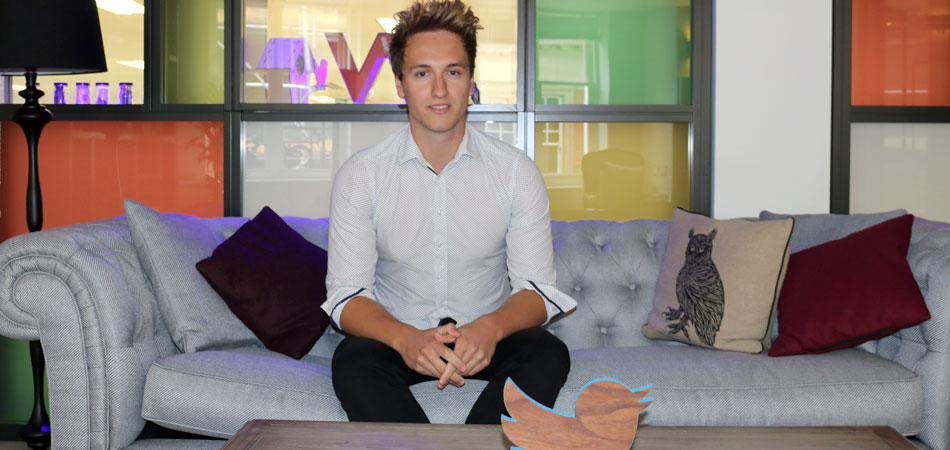
Boots captures the joy of saving
The Savvy Savers campaign features Boots shoppers celebrating the savings they’ve made.
Communications Manager, Twitter UK


Stewart Russell: The summer between 2nd and 3rd year of University I set out to get as much industry experience and contacts as possible. Internships at Welcome to Yorkshire (Yorkshire’s official tourism agency) and Tierney (PR agency in Philadelphia) gave me a solid grounding. The decisive point for me though came at Deloitte.
I spent a week in Deloitte’s press office that summer and learnt a huge amount in a short space of time. Almost exactly a year on, a matter of days before my graduation, Twitter UK announced their first summer internship. The amazing Laura Parsons from Deloitte put me forward for it, and after jumping through the interview hoops I got it.
The internship was three months long. Three years on they still can’t get rid of me.
Stewart Russell: Having studied Communications at the University of Leeds, I can see why it would seem like the easy option. But I was always genuinely interested by the intersection between the media and the public. Much of your time studying the communications & marketing discipline is very critical and heavy on the theory, so I was always compelled to get out and see for myself what holds true in the practical world.
I actually wrote my dissertation on the effects of anonymity in social media, so when the chance came up to combine my fascination in social media with my understanding of communications for a career, Twitter wasn’t a very hard choice.
Stewart Russell: Fundamentally it comes down to two things: 1) Relationships and 2) A nose for a great story.
1) There is often a misconception from my friends and family that my day consists of a series of press releases about Twitter. The reality is that I steer away from blanket releases, as there is so much more value in working closely with a trusted reporter on an insightful story, rather than spamming something far and wide and hoping it might get traction.
2) Having a strong news sense is essential as it keeps what is going to work for the journalist at front of mind. It’s about understanding that and thinking ahead as to how a story will play out, both proactively and reactively.
Stewart Russell: I’d say there’s three particular highlights that I’m proud of.
I look after our sports PR for Europe so it has been incredible to be working on this summer of sport, from Leicester’s title success, to Wimbledon, to the EUROs to #Rio2016. Sport is naturally one of the biggest drivers of conversation on Twitter, so where I come in is reliving the decisive moments during these events through our unique data insights into fan discussion.
For example, the night Leicester won the league we announced an 86% increase in normal Twitter activity in the UK, with their victory Tweet becoming one of the most Retweeted posts of all time. Or take #TeamGB’s recent gold medal haul in Rio; we created our own Twitter medal tables to determine who the most-mentioned GB athlete was, who gained the most followers etc.
Another highlight is definitely Periscope. We acquired the live streaming app, which allows anyone to broadcast instantly anywhere in the world last year and I worked closely with co-founder/CEO, Kayvon Beykpour, to raise the app’s presence in the UK with a series of high profile interviews, such as Telegraph and SkyNews.
Finally, I’d have to say the BRITs 2016. The BRIT Awards wanted to make it the most digital event to date, and we worked closely with them to make it just that (7.5 million Tweets on the night alone). My job was to amplify to press all the amazing conversations happening on Twitter in the build up to the event so that music fans knew how they could get involved.
The two highlights within this were special, limited edition, Twitter emojis for all performers that appeared in Tweets through a dedicated hashtag (e.g #ColdplayBRITs), and two of the actual awards being determined by an exclusive Twitter vote.
Stewart Russell: What’s challenging is that the way people consume their news is changing at such pace, we can no longer assume that everyone will buy a daily paper or watch the news at 10. Consumers are getting their news from such a wide range of sources that comms professionals have to think carefully about how they reach the most valuable outlets within a fragmented media landscape.
I think at Twitter in particular there is one unique challenge that I’ve noticed during my time here.
Twitter has been around for a decade now, and given its power as a breaking news platform it’s unsurprising that journalists are some of the most avid, sophisticated users of it. Why is this a potential obstacle for us though in terms of press? Because Twitter is so integral to journalists day to day toolkit, sometimes it’s hard to get them to write the kinds of back-to-basics stories that will remind lapsed users why Twitter is essential in their lives, whilst grabbing the attention of new users.
But it is a welcome challenge as it keeps us always on our toes, ensuring that we are pitching only the strongest stories to the the right contacts, to clearly communicate the value of Twitter in people’s everyday lives.
Stewart Russell: I think it really just becomes second nature. When I joined Twitter in 2013 it was as simple as 140 characters. Fast forward three years and we now have Vine, Periscope, custom emojis, GIFs, Twitter Moments and countless other new creative possibilities that we can build a story around.
Combine this with the constantly evolving nature of PR and it can be challenging at times, but if there wasn’t a constant sense of momentum and innovation I think I would get bored fairly quickly. There is no option but to be nimble, and that drives me.
Stewart Russell: My role has a broad UK focus on everything from consumer, to product, to B2B, to corporate comms. But then of course leading our sports efforts across Europe means my role also has a specialised element.
I’d actually say the best thing about working at Twitter is the sheer variety of an average day. Earlier in the summer I recall yo-yoing between:
· Keeping Twitter conversation at the heart of the Brexit debate with live ‘Decision Night’ data updates on ITV
· Telling football fans they can Tweet to turn the Eiffel Tower the colours of their national team each night during #Euro2016
· The Queen sending her 2nd ever Tweet to thank the public for her 90th birthday wishes
· Announced a big product update that allows users to add stickers to photos in Tweets
· Built up to the return of #Glastonbury by releasing the most-discussed headliners of all time on Twitter
· Piloted a new service with TFL where commuters can get real-time travel alerts via DM when there’s disruption
I don’t think labels such as ‘generalist’ or ‘specialist’ are important. What matters is being adaptable to the fast-paced nature of the world of technology PR.
Looks like you need to create a Creativebrief account to perform this action.
Create account Sign inLooks like you need to create a Creativebrief account to perform this action.
Create account Sign in